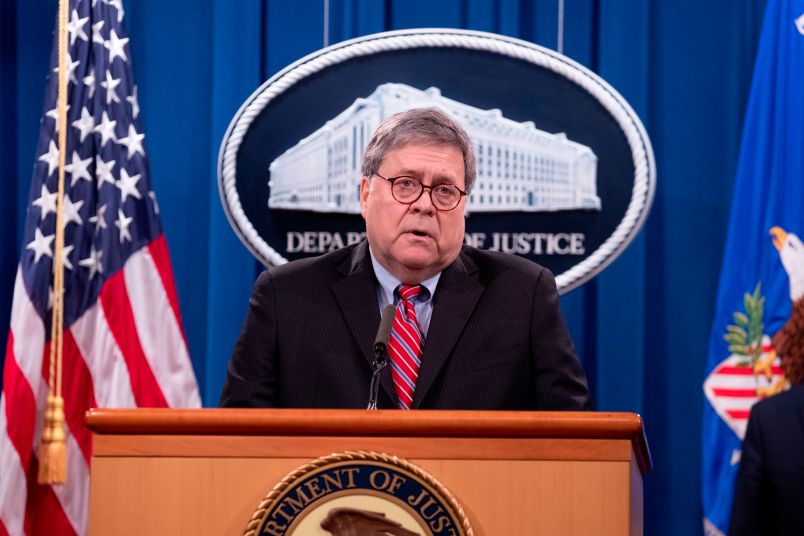A federal judge accused former Attorney General Bill of plotting to get a “jump” on the department’s “public relations” spin of Special Counsel Robert Mueller’s report and then obscuring that scheme in later Freedom of Information Act litigation.
The swipes at Barr’s handling of the Mueller probe came in previously redacted portions of a May 3 opinion that ordered the release of an internal DOJ memo related to the Mueller report.
Judge Amy Berman Jackson unsealed the unredacted opinion Tuesday after the Biden administration agreed to a release of her opinion in full, even as it’s fighting in court to keep some parts of the internal DOJ memo private.
The litigation and Jackson’s description of the memo sheds light on how Barr sought to shape the public perception of Mueller’s probe, by releasing a letter to Congress “summarizing” Mueller’s report several weeks ahead of when it made the report itself public.
Jackson and another federal judge have said Barr’s summary didn’t square up with Mueller’s own explicit refusal in his report to clear the former president’s conduct.
The memo being sought in the FOIA case was assembled by the Justice Department’s Office of Legal Counsel — which gives legal advice to the federal government — in the weekend between when Barr received the report from Mueller and when he sent the summary letter.
Jackson earlier this month ordered the department to release previously redacted portions of the memo, because she concluded that the sections did not meet FOIA’s carve outs for “predecisional” deliberations and for attorney-client privilege.
The Biden administration late Monday night agreed to release some of the memo sections in question, but is appealing her findings for other parts of the memo.
The unredacted version of Jackson’s opinion includes a lengthy section in which she describes what Trump’s DOJ was up to in the withheld parts of the OLC memo.
One of the “apparent purposes of the memorandum” was to “justify the Attorney General’s plan to opine about the strength of the evidence,” Jackson wrote, “even though he and his team were well aware that under DOJ policy, there was no prosecution decision to be made.”
In Jackson’s telling, the department hid this purpose in the FOIA litigation and instead suggested that the OLC was advising Barr on whether to prosecute Trump. In a filing Monday night, the Biden administration acknowledged that a decision whether to prosecute Trump was never “in play,” given a DOJ policy prohibiting charges being brought against siting president.
Instead, the OLC was advising Barr on whether he could come to his own determination as to whether the conduct Mueller described would be of the sort that the DOJ would prosecute, if it were not for its internal policy of not charging sitting presidents. The OLC memo, according to the judge, also weighed in on whether Barr could communicate his determination to the public.
“This is news,” Jackson said, as the DOJ’s filings in the FOIA litigation did not inform “the Court that whether the Attorney General should offer a public opinion was even a subject of the memorandum.”
Once she herself got to review the memo in private, it revealed “that there was no decision actually being made as to whether the then-President should be prosecuted.”
Instead, “the agency was girding for a preemptive strike on the Mueller report,” she wrote.
According to Jackson, the department had not been not been candid about the memo’s purpose. She said the government’s arguments in the FOIA case suggested “that the Attorney General’s advisors were helping him make a decision about whether to initiate or decline a prosecution.”
“So why did the Attorney General’s advisors, at his request, create a memorandum that evaluated the prosecutive merit of the facts amassed by the Special Counsel? Lifting the curtain reveals the answer to that too: getting a jump on public relations,” she wrote.
In a court filing announcing its plans to partially appeal her ruling, the Biden administration conceded its arguments could have been “clearer” but denied that there had been inaccuracies in the department’s previous descriptions of the memo.
Jackson on Tuesday gave the watchdog group that brought the FOIA case, Citizens for Responsibility and Ethics in Washington, until Friday to weigh in on the DOJ’s request that she pause her order demanding the memo’s release while it is appealed.
Read the unredacted opinion below:



